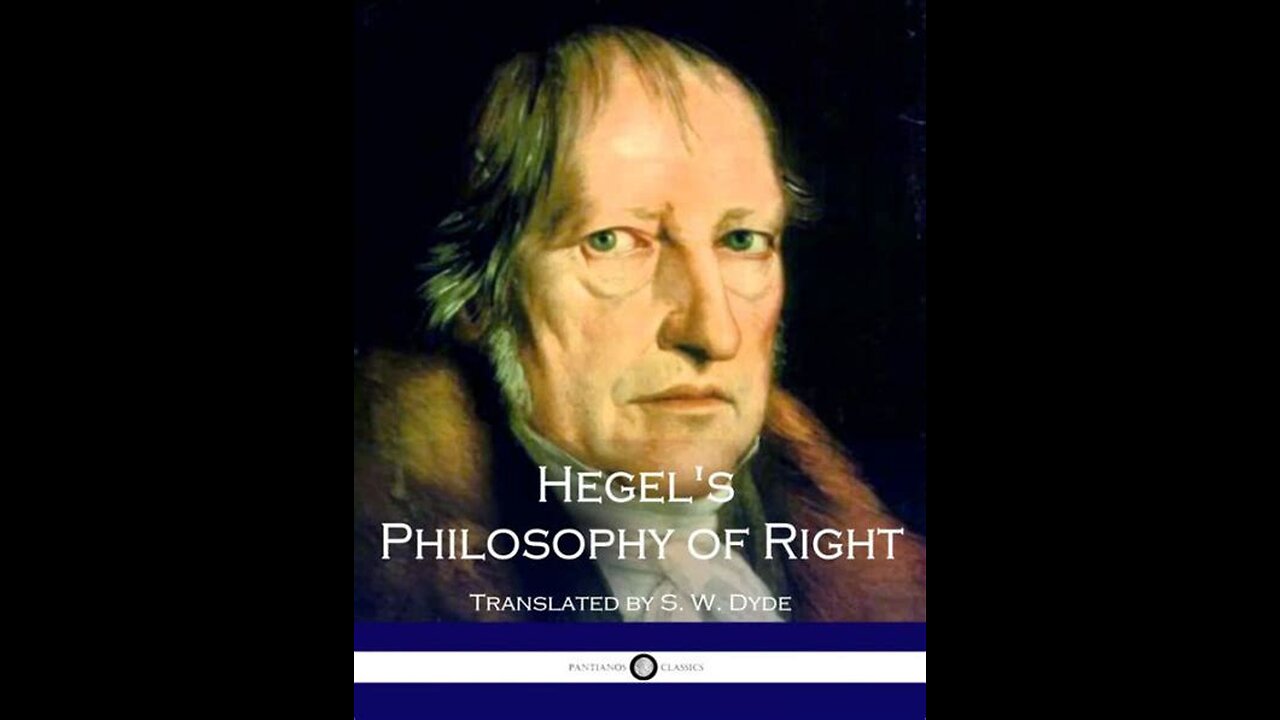Premium Only Content

The Philosophy of Right by G.W.F. Hegel | Summary and Critique
Buy Here: https://amzn.to/4aoA8a5
"""The Philosophy of Right"" is a philosophical work written by Georg Wilhelm Friedrich Hegel and published in 1820. It is one of Hegel's major works in political philosophy and presents his comprehensive account of ethical, legal, and political principles. The book aims to provide a systematic framework for understanding the nature of the state, individual rights, and the ethical foundations of society.
Hegel's ""The Philosophy of Right"" begins by examining the concept of freedom and its relation to individual and social life. He argues that true freedom is not merely the absence of constraints but the realization of one's true nature within a social and political context.
Hegel develops a theory of ethical life and presents a tripartite structure of society comprising the family, civil society, and the state. He argues that these spheres are interconnected and mutually dependent, each with its own set of rights, obligations, and institutions.
Within the family, Hegel explores the roles and relationships between parents, spouses, and children, emphasizing the importance of love, trust, and ethical development.
In civil society, Hegel examines the realm of economic and social interactions, emphasizing the significance of private property, contracts, and labor. He discusses the market economy, division of labor, and the role of various social institutions in mediating conflicts and fostering cooperation.
The state, according to Hegel, represents the highest form of ethical life. It is a manifestation of the universal will and serves as the arbiter of conflicts, protector of rights, and promoter of the common good. Hegel discusses the structure and functions of the state, including the legislature, executive, and judiciary.
Critique of ""The Philosophy of Right"" includes the following points:
1. Conservatism and Hierarchical Views: Critics argue that Hegel's political philosophy reflects conservative tendencies and hierarchical views. They claim that his emphasis on the role of the state and the subordination of individual rights to the collective may undermine individual autonomy and perpetuate oppressive social structures.
2. Abstract Universalism: Some critics argue that Hegel's theory of rights and ethical life tends to be overly abstract and detached from concrete historical and social contexts. They contend that his focus on abstract principles and universal norms neglects the specific needs and circumstances of diverse individuals and communities.
3. Limited Engagement with Social Inequality: Critics claim that Hegel's work does not adequately address issues of social inequality and oppression. They argue that his emphasis on the rationality and harmony of the social order may downplay the experiences and struggles of marginalized groups.
4. Neglect of Individual Subjectivity: Some critics suggest that Hegel's philosophy places excessive emphasis on collective consciousness and societal norms, neglecting the importance of individual subjectivity and personal freedom. They argue that his focus on objective institutions and social roles may limit the recognition of individual rights and uniqueness.
5. Conservative Gender Roles: Critics argue that Hegel's treatment of gender roles within the family perpetuates traditional and patriarchal conceptions. They claim that his views on marriage and the role of women reflect outdated and restrictive gender norms.
Despite these critiques, ""The Philosophy of Right"" remains a significant work in political philosophy, offering a comprehensive framework for understanding the interplay between individual freedom and social order. Hegel's ideas continue to influence debates on topics such as political legitimacy, the role of the state, and the relationship between individual rights and collective well-being."
-
 41:04
41:04
Coin Stories with Natalie Brunell
1 day agoCooking, Culture & Crypto: Norma Chu’s Food Empire Turns Bitcoin Treasury
24.8K -
 LIVE
LIVE
JuicyJohns
1 hour ago $0.15 earned🟢#1 REBIRTH PLAYER 10.2+ KD🟢
37 watching -
 1:21:19
1:21:19
JULIE GREEN MINISTRIES
3 hours agoLIVE WITH JULIE
63.3K151 -
 LIVE
LIVE
GritsGG
1 hour agoWin Streaking! Most Wins 3485+ 🧠
22 watching -
 1:02:09
1:02:09
The Confessionals
21 hours agoThe Supernatural Proof You Can’t Ignore (When Angels and Demons Showed Up) | Lee Strobel
41.3K24 -
 15:24
15:24
Degenerate Jay
22 hours ago $1.10 earned5 Best Moments In Batman: Arkham Asylum
23.4K1 -
 12:24
12:24
The Shannon Joy Show
15 hours ago🔥From Flock Cameras to Palantir: America’s Expanding Digital Cage🔥
23.4K2 -
 2:03:45
2:03:45
BEK TV
1 day agoTrent Loos in the Morning - 8/27/2025
21.2K -
 LIVE
LIVE
The Bubba Army
23 hours agoTaylor Swift & Travis Kelce ENGAGED! - Bubba the Love Sponge® Show | 8/27/25
1,172 watching -
 40:14
40:14
Uncommon Sense In Current Times
18 hours ago $2.86 earnedThe Dating Crisis in America | J.P. De Gance on the Church’s Role in Restoring Family & Faith
54.1K6